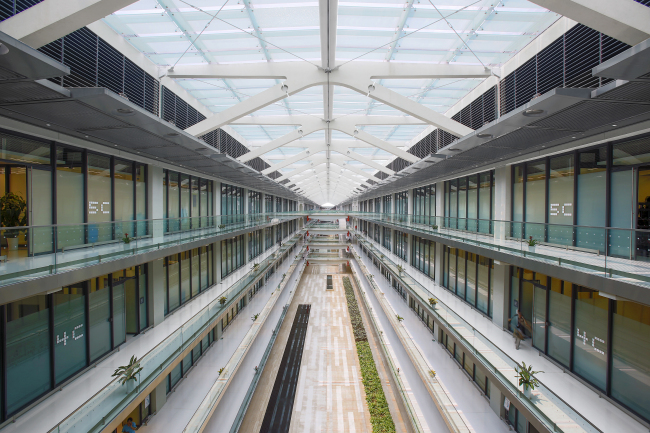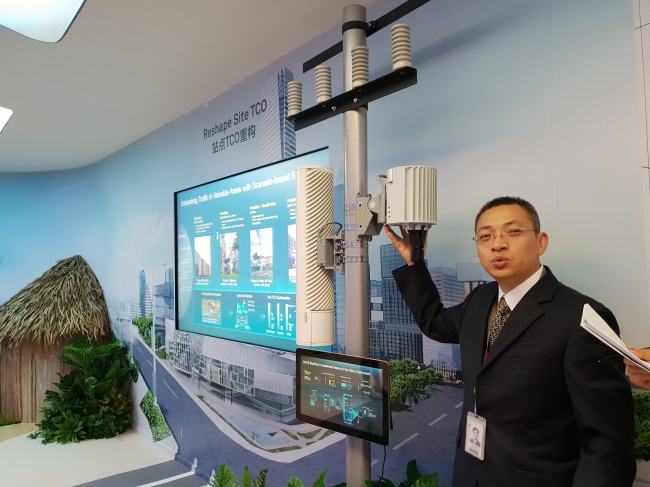Huawei dismisses security concerns in Korea over 5G drive
‘Chinese government has never asked for Huawei’s communications information’
By Song Su-hyunPublished : June 28, 2018 - 15:02
SHANGHAI -- Top officials of China’s No. 1 network equipment manufacturer Huawei Technologies strongly dismissed concerns about the cybersecurity risks of its products, promising to support South Korea’s leadership in the fifth-generation telecommunications network industry.
“South Korean mobile carriers are demanding much tougher requirements for security of their 5G networks, and we are trying hard to meet their requirements,” said Shawn Meng, CEO of Huawei Korea, at a press conference for Korean reporters Tuesday, one day before the opening of the Mobile World Congress Shanghai.
“We have high awareness of the security concerns growing in Korea, and we are dealing with the issue seriously,” Meng said. “An important fact is that there hasn’t been any accident or incident regarding security for the past decades globally during Huawei’s growth.”
“South Korean mobile carriers are demanding much tougher requirements for security of their 5G networks, and we are trying hard to meet their requirements,” said Shawn Meng, CEO of Huawei Korea, at a press conference for Korean reporters Tuesday, one day before the opening of the Mobile World Congress Shanghai.
“We have high awareness of the security concerns growing in Korea, and we are dealing with the issue seriously,” Meng said. “An important fact is that there hasn’t been any accident or incident regarding security for the past decades globally during Huawei’s growth.”

Amid increasing concerns about possible risks of eavesdropping or the theft of classified information from using Chinese network equipment products, Huawei is bidding to supply its 5G systems for Korean telecom companies that are planning to commercialize next-generation mobile services by March 2019.
Huawei has been partnering with LG Uplus, the third-biggest player in the Korean telecom industry, since the 4G network. It is now competing with global rivals like Nokia, Ericsson and Korea’s Samsung Electronics to sell 5G network systems to the country’s two largest mobile carriers -- SK Telecom and KT.
“We are discussing security measures that are much stricter than those required for the current 4G network systems,” Meng said. “Security experts at the Korean mobile carriers know about Huawei’s security technologies very well, and they have been testing our solutions closely. Passing security tests by Korean telecom companies could mean our security solutions are great.”
Peter Zhou, chief marketing officer of Huawei, stressed the company has always been complying with technological standards regarding security in particular.
“3GPP has established much more stringent guidelines on security for the 5G standards compared to 3G and 4G, which will define 5G as much more secure network services,” Zhou said. “We agree that security will be the center of 5G, considering the rising number of IoT devices being connected wireless in the era.”

In response to suspicions raised by some lawmakers in the US and security experts, who accuse Huawei of siphoning confidential data, such as military intelligence of other countries, on behalf of the Chinese government by making hidden backdoors in their network systems, the company’s chief communication officer officially denied such claims.
“The Chinese government has never asked for communications information from Huawei,” said Joy Tan, president of corporate communication.
To ease concerns, Huawei opened its R&D Center based in Pudong, Shanghai, to the Korean press for the first time.
Unlike most research and development centers run under tight guard by other companies, the Huawei R&D Center in the city was crowded with around 100 visitors from around the world.

“Each year, more than 3,000 visitors, with over 50 percent of them being foreigners, visit the Shanghai R&D Center to learn about Huawei’s vision and technologies for the next generation network,” said Yu Wenbin, senior product manager at the center.
Established in 1996, the center’s over 10,000-strong R&D staff are developing core equipment units for the 5G commercial systems, various solutions and related services.
“We are building 5G fundamental RAN as clean as possible by simplifying two antennas into one and minimizing the number of boxes on the 5G tower with a multi-band unified RRU,” Yu said. “For such network equipment, the smaller the better, but capacity should continue improving.”
Huawei has so far developed a 5G commercial system supporting up to 200 megahertz bandwidth in the 3.5 gigahertz spectrum and 200 watts in power outage, providing the highest capacity among competitors, Yu said.
By Song Su-hyun, The Korea Herald Correspondent (song@heraldcorp.com)








![[KH Explains] How should Korea adjust its trade defenses against Chinese EVs?](http://res.heraldm.com/phpwas/restmb_idxmake.php?idx=644&simg=/content/image/2024/04/15/20240415050562_0.jpg&u=20240415144419)









